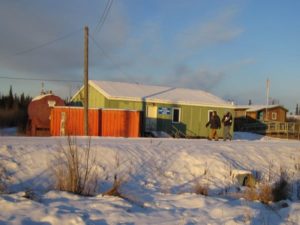
JOINT BASE ELMENDORF-RICHARDSON – Across the vast state of Alaska, small parcels of federal land host buildings used by the Alaska Army National Guard after World War II and during the Cold War. Now that these properties are no longer needed by the military, the U.S. Army Corps of Engineers – Alaska District is working to transfer the land and associated improvements to local communities, which in many instances are native villages in critical need of additional housing and community facilities.
“Partnering with native villages and the National Guard to pass ownership of these facilities breathes new life into the buildings and allows local citizens to receive vital community services closer to home,” said Col. Damon Delarosa, Alaska District commander.
The agency provides a wide array of real estate services for the Army, Air Force, Army National Guard and Air National Guard in the state. Much of the DoD-owned property is not behind large, barbed fences, but integrated into the local community. For most of this military real estate, the Alaska District serves as the public face and community liaison.
Tricia Lemay, real estate specialist, manages the divestiture program on behalf of the Alaska District. Lemay, a former paralegal with wide-ranging experience in real estate, bankruptcy and family law, enjoys the detailed work and research involved in preparing the divestitures.
However, what she finds most rewarding is coordinating with the communities who receive the buildings.
“It takes a collective effort to accomplish these actions,” she said. “It’s extremely satisfying to assist the villages in acquiring these excess facilities that are valued so much and will be put to good use for a long time.”
In 2021, the agency supported the divestiture of 11 National Guard buildings to the communities in which they reside, including two in Kongiganak. Located in the southwestern part of the state, the unincorporated village has a population of about 439 people within a census area of 1.9 square miles.
The buildings in Kongiganak were transferred to the Qemirtalek Coast Corp., which plans to hand over the former armories to the tribal government. The facilities will be renovated and repurposed to support the delivery of healthcare services in the community.
“Through collaborative efforts with National Guard Bureau and U.S. Army Corps of Engineers, we are pleased to be repurposing excess rural facilities for continued use in public service,” said Kevin Vakalis, realty officer for the Alaska Army National Guard. “The logistics of rural Alaska are a driving factor in the higher costs of construction in these communities and these buildings provide critical additional infrastructure.”[content id=”79272″]
Available buildings are rare in rural parts of the state, so repurposing these facilities reduces the need for new development.
“Everything is more expensive up here,” said Mark DeRocchi, chief of the district’s Engineering, Construction and Operations Division. “When you factor in the cost of the raw materials, transportation to the state and then shipping everything from the Port of Alaska to the communities – along with a short construction season – even the cheapest build can become too expensive for small villages. Access to an existing building saves the communities the time and expense of new construction.”
Alaska was critical to the United States’ defense efforts due to its close proximity to Russia throughout the Cold War. During this period, the National Guard established armories and Federal Scout Readiness Centers in rural communities across the state.
“While the Cold War is in the distant past for many Americans, the state’s unique history means that many Alaskans interact with remnants from the war every day,” said Kelly Eldridge, archeologist at the Alaska District.
She, along with other district archeologists, work to ensure that potential impacts to historic properties from other USACE programs are addressed in accordance with federal historic preservation requirements.
“These armories were strategically placed around the state and have served important roles in communities for decades beyond the war for which they were built,” Eldridge said.
Now, nearby communities are seeking to acquire the vacant armories through the Department of Defense’s divestiture program.
“Many local governments and village corporations have expressed interest in the land and buildings,” said Gary Hanson, chief of the Alaska District’s Real Estate Division. “They see this as an opportunity to incorporate the buildings into the community infrastructure and use them to benefit the citizens. By returning the land and facilities on them, we support both the National Guard and local community interests.”
The property divestiture process requires communication and perseverance by all parties involved to achieve a successful outcome. First, the Alaska Army National Guard prepares a report that includes an environmental history of the land and building, then transfers the document to the Alaska District for further action. The organization’s real estate team conducts title research, determines an appropriate path forward to divestiture, ensures that the land and remaining buildings are safe for public use, and executes the administrative portion of the disposal through the chain of command.
“The Department of Military and Veterans Affairs and Alaska Army National Guard have enjoyed the ongoing relationships with rural Alaska communities,” Vakalis said. “These partnerships have spanned many decades and we are pleased to transfer these properties for local benefit.”
At the Alaska District, LeMay and her colleagues are proud of their accomplishments and remain committed to the success of the divestiture program.
“We look forward to continuing our work with the National Guard and local communities to deliver positive outcomes for everyone involved,” she said.
# # #[content id=”79272″]







